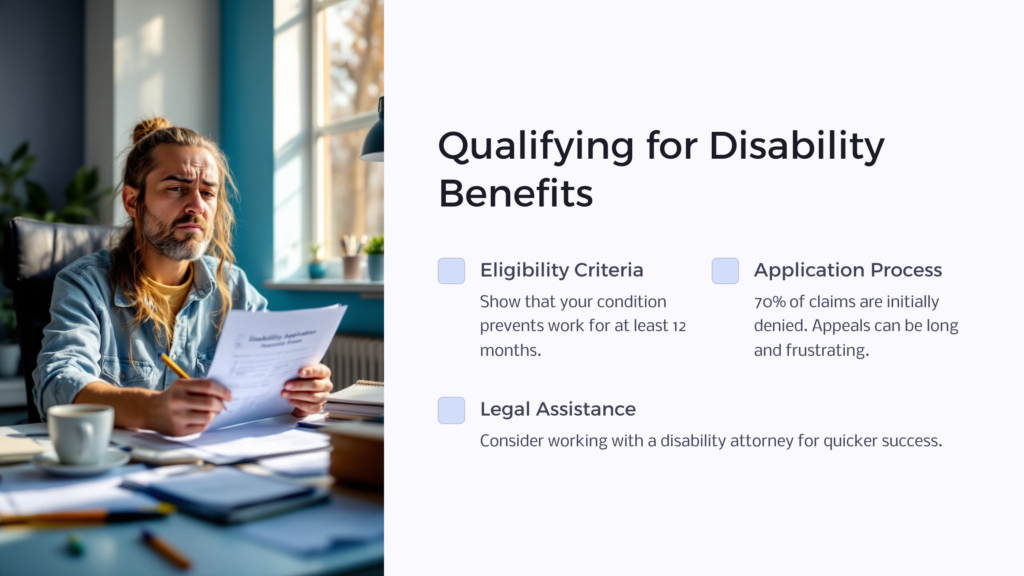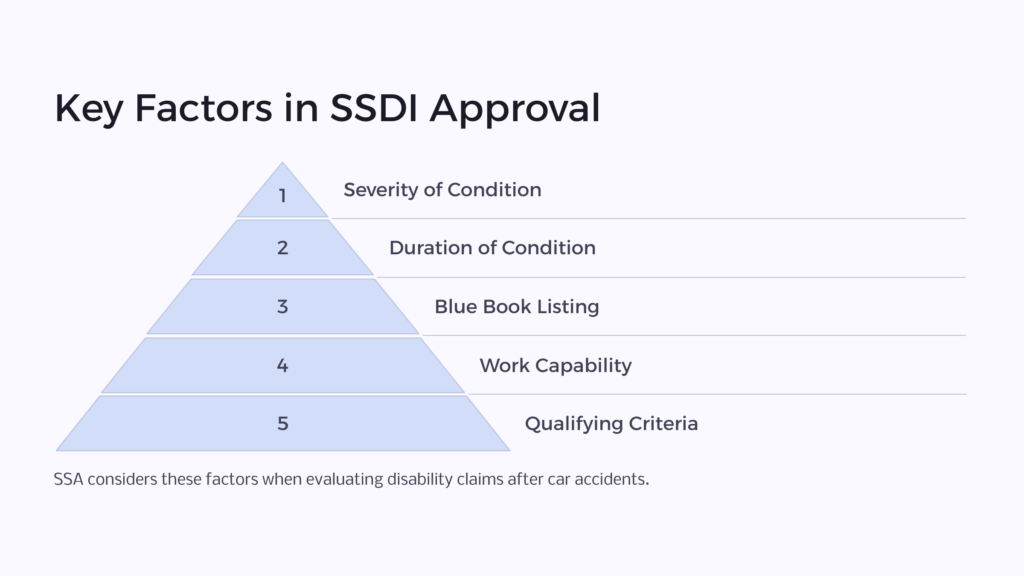Being involved in an auto accident often can have severe and long-lasting health and wellness effects. Some injuries caused by car accidents may be so severe that they can impede your ability to work, often for an extended period. When this is the case, you may be eligible for Social Security disability benefits through either the Social Security Disability Insurance program or the Supplemental Security Income program.

Qualifying for either SSDI or SSI benefits can help you cover your day-to-day expenses, medical care, and other needs that arise while you’re unable to work because of a traumatic injury. Several types of car accident injuries may be eligible for Social Security disability benefits.
7 Car Accident Injuries That Qualify for Disability Benefits
- Traumatic brain injury
- Whiplash
- Fractured bones or joint injuries
- Back injuries
- Severe burns
- PTSD or anxiety
- Hearing or vision loss
Both SSDI and SSI benefits exist to help disabled Americans cover their costs of living when unable to work because of their disability or medical condition. Generally, to qualify for disability benefits, you must be able to show that your medical condition or personal injury has prevented you from being able to work for at least 12 months. The SSA expects to see that you are unable to participate in any gainful employment.
Before you begin the process, keep in mind that as many as 70% of claims are denied upon first review. While many are ultimately successful through the appeals process, the entire process from start to finish can be long and frustrating. You might find that working with a qualified disability attorney can help you navigate the system with quicker success and less frustration.
Let’s take a closer look at some of the car accident injuries that may make you eligible for Social Security disability benefits. Keep in mind that sustaining one of these accident injuries does not automatically qualify you for Social Security disability benefits – you must submit the appropriate application and supporting medical evidence to validate your claim. Also, just because your specific car or truck accident injury isn’t listed doesn’t mean your claim will automatically be rejected.
1. Traumatic Brain Injury
It’s common for car accident victims to hit their head on the steering wheel or dashboard, which can lead to traumatic brain injury. Many of the effects of this kind of head injury can render a person unable to work, including short-term memory loss, inability to focus or complete tasks, and other impairments that can greatly impede day-to-day work tasks. Speech and sensory impairment – like vision and hearing – also can be associated with traumatic brain injury and render someone unable to work.
2. Whiplash
This type of common car accident injury on its own doesn’t typically qualify a claimant for disability benefits. However, if a whiplash injury is accompanied by a spinal cord or more severe neck pain or back injury, you may be eligible for disability benefits. For this type of physical injury to be approved for benefits, you typically would need to submit an MRI report that conveys the extent of the neck or spinal injury associated with your whiplash and shows definitive soft tissue damage.
3. Fractured Bones or Joint Injuries
Fractured bones of the arms or legs can be particularly debilitating when it comes to your employment. If you’ve broken bones and have not been able to regain full use of an arm or leg, despite surgery, physical therapy, or other treatment, you may qualify for disability benefits. This is especially true if a fracture leaves you unable to walk after your accident. The same goes for severe joint injuries, like a hip or knee injury, that may make it impossible for a claimant to walk or sit as the job demands.
4. Back Injuries
Back and spinal cord injuries can be long-lasting and have debilitating effects that make it difficult or impossible to work after a motor vehicle accident. After surgeries and other treatments, if your back injury is still severe enough to make working throughout the day impossible, you may qualify for disability benefits.
In addition to causing new spinal cord injuries, car crashes also often irritate old injuries or spinal conditions or cause them to flare up and become even more painful. Some people who suffer back or spinal cord injury may deal with ongoing chronic pain, or with limited mobility in their neck, back, legs, torso, or hands.
5. Severe Burns
Burns are common injuries suffered in car accidents, due to explosions, vehicle fires, and chemical burns suffered when an airbag is deployed. Severe burns often take a very long time to heal and often bring with them long-term nerve damage and chronic pain. If a severe burn leaves you unable to perform job duties, this car accident injury may be eligible for Social Security disability benefits.
6. PTSD or Anxiety
Many victims of car accidents suffer long-term psychological injuries that can affect their ability to perform their day-to-day job duties. Memories associated with the accident can result in everything from sudden anger or anxiety to irritability, mood swings, loss of appetite, and more. In these types of claims, SSA reviewers will assess whether the PTSD condition has been severe and ongoing to the point that it renders the claimant unable to adjust to the rigors of day-to-day work life. In some cases, while a PTSD diagnosis may not be ruled sufficient for disability benefits, it may merit a medical-vocational allowance instead.
7. Hearing or Vision Loss
Sensory impairments like hearing or vision loss often occur after a motor vehicle accident. These injuries can have a tremendous negative effect on someone’s ability to carry out day-to-day activities associated with a typical work day.
Can I Get Short Term Disability After a Car Crash?

Short-term disability is not available with SSDI or SSI benefits. This type of program is run by select states in the United States instead of the federal government. Short-term disability is designed to help those who have short-term, non-work-related medical conditions or difficulties that keep them from working for a specified period.
Short-term disability benefits currently are available in five states: California, Hawaii, New Jersey, New York, and Rhode Island. This type of coverage is offered by the state and typically is funded by your employer.
To be eligible for short-term disability benefits, you’ll need to live in one of these five states and meet the following criteria:
- You must have been employed by your employer for its specified period of time
- You must meet minimum income requirements
- You must be disabled for a minimum of one week
- Your illness or serious injury cannot be work-related
- You must provide appropriate documentation of your disability
- You cannot draw benefits for longer than 30 weeks – or 52 weeks if you live in California
Depending on the state-specific program, some claimants receive their first short-term disability payments in as little as eight days.
 How to Qualify for SSDI Benefits After a Car Accident
How to Qualify for SSDI Benefits After a Car Accident
The first step in qualifying for SSDI disability benefits is filing your injury claim. You can do so online, or you can call the SSA at 1-800-772-1213 to have them walk you through the process. You can even make an appointment at your local Social Security field office and submit your claim in person. Before you start, you may want to consider working with a disability attorney, who can help you identify the best way to get your claim started. Most disability lawyers offer free consultations – they can review your case and advise you on the strength of your claim, along with what kind of documentation may prove most helpful.

While many injuries associated with car accidents can be disabling for a long period of time, it’s important to remember that the SSA is most concerned with how a particular condition affects your ability to complete your job duties, not necessarily how the severe injury or condition came about. Just because you were injured in an auto accident doesn’t necessarily mean you’ll be approved for Social Security disability benefits. You still have to go through the entire application and approval process, which may also include appeals.
- Severity of your condition – is your condition sufficient to keep you from performing your job duties?
- Duration of your condition – has your condition kept you from working for at least 12 months and/or is it terminal in nature?
- Is your condition listed in the SSA’s Blue Book of disabling conditions?
- Does your disability keep you from not only performing your previous duties, but also from performing other work duties for which your skills might transfer or you could be trained? Are you unable to be trained for other less demanding or alternative work?
- Do you meet other qualifying criteria – for SSDI, this means working long enough to have accrued enough Social Security credits, and for SSI, this means meeting qualifying income criteria. For most SSDI benefits applicants, this typically means having earned at least 40 credits, with at least half of them earned within the most recent decade.

SSA reviewers will closely evaluate your application for benefits, along with the medical evidence and documentation you provide to support your claim. They consider the side effects of your stated injury, how much you have recovered from the original auto accident injury, and whether any medications you take to treat your condition could also impair your ability to effectively carry out your work duties. They may also seek professional medical opinion about whether you have effectively complied with all recommended medical care and how much your condition reasonably affects your ability to work.
Ultimately, the SSA will assign you a residual functional capacity, which indicates your ability to perform sedentary, light, or heavy physical labor. Generally, you should expect a rating of less than sedentary to be able to qualify for benefits. Exceptions can include applicants that are over age 55 or those who cannot transfer to a new type of work based on job skills.
Some Car Accident Injuries May Qualify for Disability Benefits
Enduring a car crash can lead to painful and debilitating injuries with effects that can cause long-lasting damage to your ability to work. When this is the case, Social Security disability benefits can help you cover everything from health care costs to day to day expenses like food and housing. While only specific injuries with documented debilitating effects on work skills are eligible, it’s good to know your options and be familiar with the types of injuries that may make you eligible to receive Social Security disability benefits. This allows you to make an informed choice about whether to seek disability benefits after a car accident.
 Benefits.com Advisors
Benefits.com Advisors
With expertise spanning local, state, and federal benefit programs, our team is dedicated to guiding individuals towards the perfect program tailored to their unique circumstances.
Rise to the top with Peak Benefits!
Join our Peak Benefits Newsletter for the latest news, resources, and offers on all things government benefits.



















